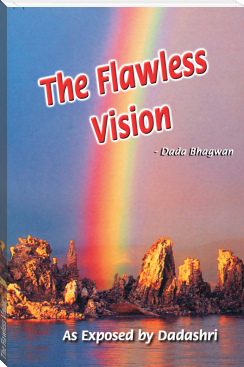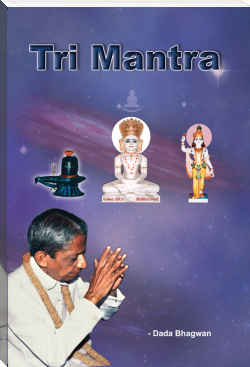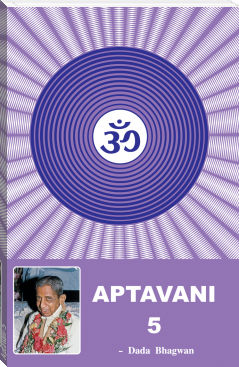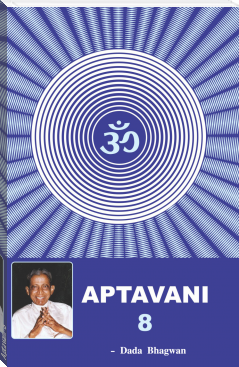The Flawless Vision - Dada Bhagwan (short novels in english TXT) 📗

- Author: Dada Bhagwan
Book online «The Flawless Vision - Dada Bhagwan (short novels in english TXT) 📗». Author Dada Bhagwan
When ‘Chandubhai’ makes a mistake and ‘You’ do not like it, that is called seeing your own faults.
Your life is the end results of your own karma of punya and paap. When you receive praise, that is because of your punya and when you receive insults, that is the result of your paap. Of importance is your ability to remain neutral (samta-without raag or dwesh) while enduring both.
Most of the mistakes are created because of speech. You can resolve many of these by maintaining your awareness and remaining silent. By keeping your vision focused on the reality (samyak drashti), you will not create any more mistakes and will destroy existing ones. Even after Self-Realization, you will have kashays, but you will immediately have the awareness and be able to keep it separate.
The Akram Vignani destroys all the twenty-five moha by giving you the Knowledge of your Real Self. By stating that all good habits and bad habits are an illusion, he has liberated us from everything.
When can you point out mistakes in others? When they are not able to see their mistakes on their own and providing that they feel indebted to you for doing so. You cannot create kasay if there is too much salt in the cooking.
True pratikraman is only done when you see your own faults and see everyone in your home as nirdosh.
How long should you continue doing pratikraman? For as long as you have negative feelings towards that person or as long as you keep remembering that person. As long as you have an ‘attacking nature’, you will continue to suffer.
No matter what the other person does to you, you should avoid conflict and distance yourself.
When you know that you are not the ‘doer’, but see others as ‘doers’, it is the same as becoming the ‘doer’. You automatically become the ‘doer’ when you see others as ‘doers’ even in the slightest degree. It does not matter if the prakruti is fighting, do not see him as the ‘doer’, because in reality vyavasthit (scientific circumstantial evidences – which bring forth the effect of past karma) is the doer not him.
It is the ego that makes a mistake and also the ego that ‘sees’ the mistakes. The ego is always the one who sees the faults.
Keep asking for forgiveness the whole daylong. Get into the habit of doing this. Only through the Gnani’s grace will your work be done. There is no need for you to go about doing anything frantically. The Gnani’s grace is bestowed upon you when you abide by his aagnas (prescribed instructions). By abiding by his aagnas, you will acquire the state of unperturbed bliss (samadhi).
The Soul is Vitraag (void of attachment) and so is prakruti. But if you find faults with the prakruti, there will be repercussions. You yourself are at fault if you see faults in others.
You should never leave Dada’s satsang even if you are snubbed and dishonored there. Remain with the satsang till you die, but it is not worth going anywhere else. What is more, do not see anyone’s faults in the satsang. Otherwise you will bind indestructible karma. If you do, erase the fault by immediately by doing pratikraman, otherwise that karma will become nikachit (indestructible). Never ever, see faults in a Gnani Purush. The one who uses his intellect to assess the Gnani will inevitably fall and become destined towards a life in hell. Only certain exceptional people are able to be in close proximity of a Gnani and not see any faults in Him. Only such people are able to remain in the service of a Gnani.
By seeing faults in others, you weaken the power to see your own faults. No one is at fault, and if you want to blame anyone, blame vyavasthit. Vyavasthit means your own accounts (karmic) coming back to you. The consequences of your own mistakes are being brought to you through a natural process, which brings together your nimit.
Every karma of the Gnani is divine in nature. His external karma is the same as everyone else’s but of significance is only close observation of the Gnani’s vitraagta (detachment). By seeing the vitraagta of the one in front of you, you too can become Vitraag.
What are the attributes of the one desirous of moksha? He is open to the sky. He openly declares his faults.
You cannot see your mistakes because you become one with them. It is because you are oblivious to them they remain bound to you. That mistake will be destroyed if it is acknowledged. Now you have become the pure Soul, so now you have to make your body pure also. And it will become pure just by observation.
The one that does atikraman (deeds or actions associated with raag or dwesh), has to do pratikraman. The pure Soul does not do atikraman and that is why it does not have to do pratikraman. You have to keep this principle in your awareness.
Dadashri says that his pratikraman automatically start even before the mistake is made. That is the reward of pure awareness (jagruti).
The awareness in its absolute state does not even see a mistake as a mistake, but as gneya (the object to be observed), and He himself is the ‘observer’. These gneya are the basis for the act of observation.
Do not look at anyone as doshit or nirdosh – simply know that they are nirdosh.
Observe your own prakruti; to observe what ‘Chandubhai’ is doing is considered pure awareness (upyog)? Why are you not able to observe your prakruti? It is because of avarans (karmic veils that obscure your ability to see). How can you break these avarans? Through the vidhis (sacred ceremonies) the Gnani makes you perform.
The Gnani too has the subtle and subtle most mistakes, which can be washed off by pratikraman.
Who is the one who looks at the faults of the prakruti? Prakruti sees prakruti, the one that sees is the ego and the intellect. The Soul remains unaffected in all this. There is no such thing as wrong or right as far as the Soul is concerned. It is the elevated prakruti that helps you see the
ImprintText: Dada Bhagwan Aradhana Trust
Images: Dada Bhagwan Aradhana Trust
Publication Date: 07-07-2017
All Rights Reserved





Comments (0)